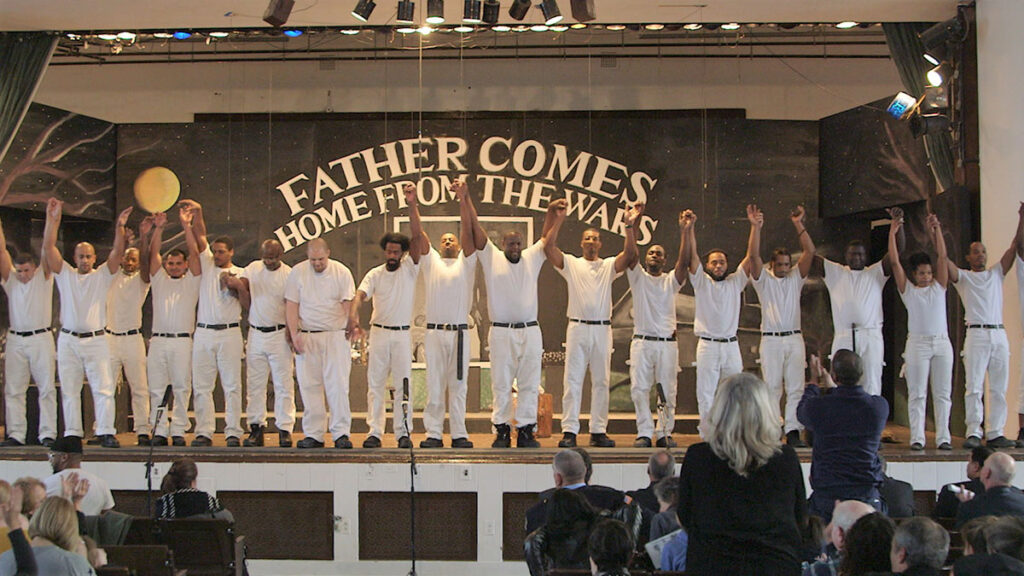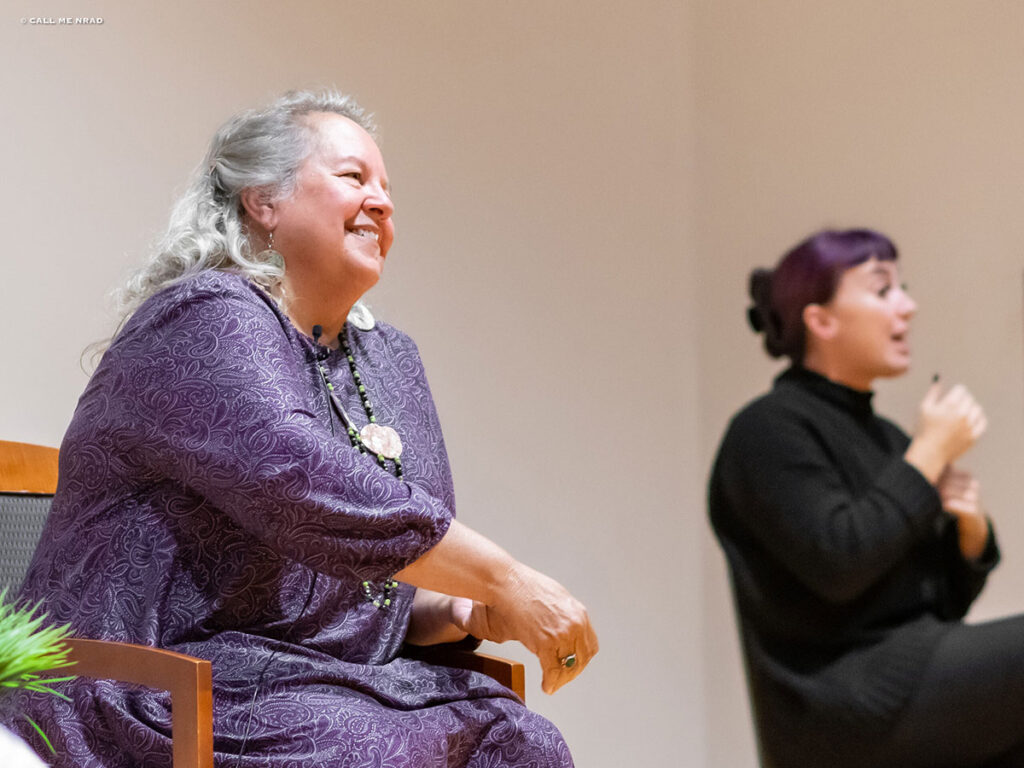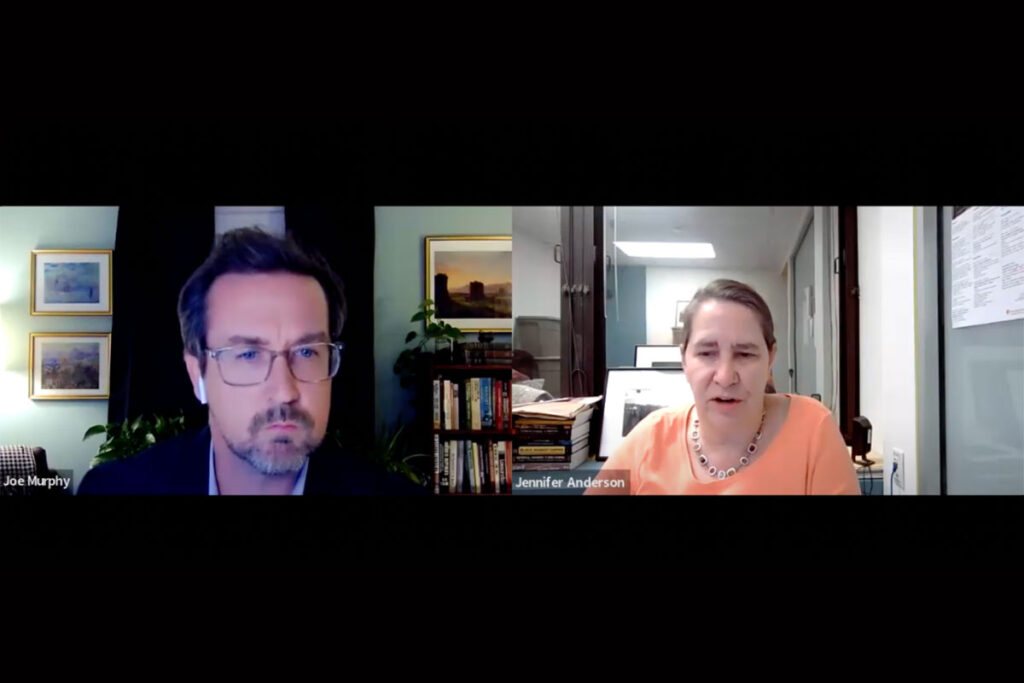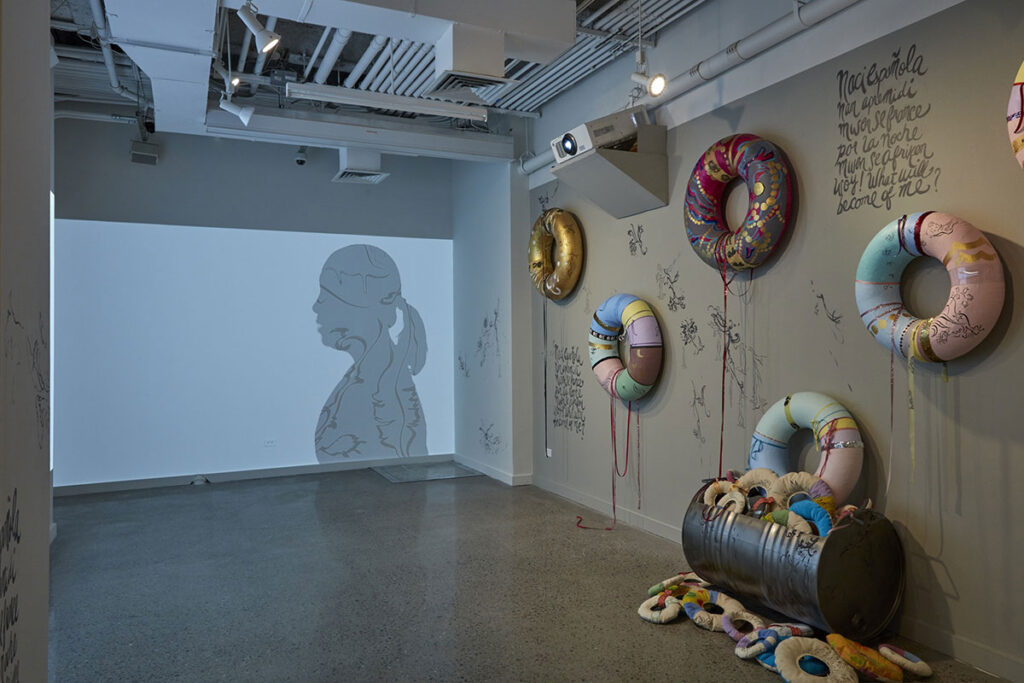Humanities New York (HNY) is the sole statewide proponent of Public Humanities programs. Through grant–making and events, we aim to bridge the gap between scholarly study and real-world impact. Our grants support community–centered activities such as workshops and reading groups, providing New Yorkers with opportunities for collaborative and engaged learning across the vast field of disciplines known collectively as the Humanities.
Our Work
Our two primary means of propagating the Humanities throughout the state are through grants and programs. We provide funding to local cultural organizations to imagine, design, and execute programs that rely on cornerstone practices of the humanities—open communication, critical thinking, reasoning—to address complex and important issues from the community level upward. We organize and host virtual and in-person events that platform illustrious speakers. With dialogue-based programs, we encourage collective inquiry into topics provoking conversations in media, government, and academia.
We champion grantees and promote their projects through strategic marketing and communications. We work directly with community leaders and educators to facilitate success. Our advocacy efforts help preserve Public Humanities programs at the local, state, and national levels. We produce original editorial content that aligns with our mission and provides background and context for our work. Through partnerships, we support the work of other New York-based humanities initiatives.
OPTION 2: Our Focus Areas
The scope of the Humanities, writ large, is nearly boundless. History, philosophy, social sciences, and literature are just a few of the avenues through which people contemplate infinite variations on the question of what it means to be human.
Breadth affords Humanities New York with creative license when it comes to our work. To maintain focus and ensure that our efforts are intentional as well as impactful, we prioritize four subjects of current, significant civil discourse that represent areas of intervention, wherein the humanities can introduce new perspectives and illuminate paths forward.
These focus areas are intended to be fluid and flexible, allowing for generous interpretation and overlap. We will continuously revisit them to adapt to the needs of New Yorkers as history unfolds and new issues emerge. We will be vigilant that these domains limit neither our work nor our grantees’; we will reserve space for humanities projects that fall outside these areas.
The following themes will be the basis of most HNY-hosted programs. Grant applications that foreground these subjects will be given special consideration. While our purview will remain broad, we will endeavor to hone our expertise and cultivate a robust culture of learning related to these focus areas.
Rehabilitation Through the Arts (RTA)—Post Incarceration Humanities Partnership grantees—uses the arts as a tool to develop critical life skills in New York State men’s and women’s prisons, modeling an approach to the justice system based on human dignity.
Carceral Culture and its Effects
Terms and slogans abound in contemporary thinking about the prison system. It has become commonplace to hear about mass incarceration, the carceral state, defunding the police, prison reform, and prison abolition. Yet even while the prison system impacts the lives of many Americans, many others view it from a distance, imagining incarceration as something that happens to other people.
The term “Carceral Culture” is helpful in understanding how the U.S. prison system affects all Americans. Systems of surveillance, for example, provide privileged groups with a sense of security. But for those more likely to be targeted by police, they provoke fear and anxiety. Humanities New York seeks to raise awareness of the reality that the rights of some come at the expense of others, and that the responsibility of reforming discriminatory institutions falls to all Americans.
Taking Care: The Environmental Humanities and Public Health
Dire news about a changing climate and potential ecological disaster have weighed on our collective minds for decades. In recent years, environmental threats have seemed to escalate, in fateful—if incidental—tandem with the onset and aftereffects of the COVID-19 pandemic. Both crises impacted marginalized groups disproportionately, throwing the fraying of the so-called “social safety net” into relief.
HNY seeks to foster a deeper appreciation for and awareness of the systems that support human flourishing. Humanity can reframe how we think about and respond to climate change by drawing on a range of philosophies and stories about humanity’s relationship to the environment. Similarly, we can also imagine public health in new ways by envisioning our health—both individual and collective—as an experience inseparable from the “natural world.” We invite our audiences and partners to interrogate the imagined barriers that separate the “human” from the “natural”, examine the values that shape our scientific discourse, and consider what it means to steward our personal, social, and ecological health.
As part of HNY’s dialogue-based event series, The American Imagination, Robin Wall Kimmerer articulated the connection between mutual aid and environmental stewardship: “When we treat one another as the gifts that we are to each other, rather than thinking that we live in a, I don’t know, like a big warehouse full of commodities, what if we lived in a big village full of our relatives? That would turn everything around.”
Jennifer Anderson of Stony Brook University joined HNY for a discussion part of the Land, Liberty, and Loss: Echoes of the American Revolution program, which is an ongoing online event series that enlists scholars to guide audiences on an exploration of our nation’s history, reflecting our belief that misapprehensions of history often serve as an obstacle to full democratic and civil flourishing.
Expanding the Narrative: More Perspectives on American History
HNY is proud to have worked with Indigenous individuals, native nations, and tribal groups across the state in order to center perspectives that are valuable to our understanding of environmentalism, history, and other important interests. We will continue to fund projects and host programs that foreground the original, displaced inhabitants of the country.
As we approach the 250th anniversary of America’s Independence, we plan to expand our scope to include additional groups whose experiences have been denigrated for the sake of a more pristine American mythos. While our central focus will remain on Indigenous perspectives, we will build upon our work to delve into intersectional experiences, such as the relationship between Native Americans and Black Americans. Ultimately, we will attempt to uncover and amplify narrative histories and stories that contribute to a more complete and honest view of the nation’s history.
The Past, Present, and Future State of the Humanities
The current moment represents a critical juncture for the Humanities in the realms of academics, business, and civic life. The “value” of a Humanities education is a fierce subject of debate among higher education institutions. A version of the same argument reverberates in corporate spheres, thanks to the rapid acceleration of AI and its potential to displace workers whose roles are more reliant on emotional intelligence. Political polarization intrudes upon the daily lives of Americans via 24/7 news coverage and social media.
But this is not the first time in American history that extremism has threatened equal rights, and by extension, the preservation of democracy. Nor is it the case that we as a society have never faced technological shifts that risk reducing people to data points and their work to capital gains. As we approach a 50-year milestone, we will turn to our archives and beyond to explore how similar challenges have been met through programs that recognized critical thinking and dialogue as defenses against totalitarianism. We will revisit HNY-supported projects led by visionaries such as James Baldwin, Eileen Myles, and Oliver Sacks, and continue to seek out exemplary thinkers to provide perspective and guidance on challenges with and without precedent.
The Humanities Center Initiative is a statewide partnership with a network of humanities centers at nine New York State universities. Launched in 2012, the HCI supports humanities institutes, faculty, and graduate students in their commitment to public engagement.
OPTION 3: Our Focus Areas
The scope of the Humanities, writ large, is nearly boundless. History, philosophy, social sciences, and literature are just a few of the avenues through which people contemplate infinite variations on the question of what it means to be human.
Breadth affords Humanities New York with creative license when it comes to our work. To maintain focus and ensure that our efforts are intentional as well as impactful, we prioritize four subjects of current, significant civil discourse that represent areas of intervention, wherein the humanities can introduce new perspectives and illuminate paths forward.
These focus areas are intended to be fluid and flexible, allowing for generous interpretation and overlap. We will continuously revisit them to adapt to the needs of New Yorkers as history unfolds and new issues emerge. We will be vigilant that these domains limit neither our work nor our grantees’; we will reserve space for humanities projects that fall outside these areas.
The following themes will be the basis of most HNY-hosted programs. Grant applications that foreground these subjects will be given special consideration. While our purview will remain broad, we will endeavor to hone our expertise and cultivate a robust culture of learning related to these focus areas.
Carceral Culture and its Effects
Terms and slogans abound in contemporary thinking about the prison system. It has become commonplace to hear about mass incarceration, the carceral state, defunding the police, prison reform, and prison abolition. Yet even while the prison system impacts the lives of many Americans, many others view it from a distance, imagining incarceration as something that happens to other people.
The term “Carceral Culture” is helpful in understanding how the U.S. prison system affects all Americans. Systems of surveillance, for example, provide privileged groups with a sense of security. But for those more likely to be targeted by police, they provoke fear and anxiety. Humanities New York seeks to raise awareness of the reality that the rights of some come at the expense of others, and that the responsibility of reforming discriminatory institutions falls to all Americans.

Rehabilitation Through the Arts (RTA)—Post Incarceration Humanities Partnership grantees—uses the arts as a tool to develop critical life skills in New York State men’s and women’s prisons, modeling an approach to the justice system based on human dignity.

As part of HNY’s dialogue-based event series, The American Imagination, Robin Wall Kimmerer articulated the connection between mutual aid and environmental stewardship: “When we treat one another as the gifts that we are to each other, rather than thinking that we live in a, I don’t know, like a big warehouse full of commodities, what if we lived in a big village full of our relatives? That would turn everything around.”
Taking Care: The Environmental Humanities and Public Health
Dire news about a changing climate and potential ecological disaster have weighed on our collective minds for decades. In recent years, environmental threats have seemed to escalate, in fateful—if incidental—tandem with the onset and aftereffects of the COVID-19 pandemic. Both crises impacted marginalized groups disproportionately, throwing the fraying of the so-called “social safety net” into relief.
HNY seeks to foster a deeper appreciation for and awareness of the systems that support human flourishing. Humanity can reframe how we think about and respond to climate change by drawing on a range of philosophies and stories about humanity’s relationship to the environment. Similarly, we can also imagine public health in new ways by envisioning our health—both individual and collective—as an experience inseparable from the “natural world.” We invite our audiences and partners to interrogate the imagined barriers that separate the “human” from the “natural”, examine the values that shape our scientific discourse, and consider what it means to steward our personal, social, and ecological health.
Expanding the Narrative: More Perspectives on American History
HNY is proud to have worked with Indigenous individuals, native nations, and tribal groups across the state in order to center perspectives that are valuable to our understanding of environmentalism, history, and other important interests. We will continue to fund projects and host programs that foreground the original, displaced inhabitants of the country.
As we approach the 250th anniversary of America’s Independence, we plan to expand our scope to include additional groups whose experiences have been denigrated for the sake of a more pristine American mythos. While our central focus will remain on Indigenous perspectives, we will build upon our work to delve into intersectional experiences, such as the relationship between Native Americans and Black Americans. Ultimately, we will attempt to uncover and amplify narrative histories and stories that contribute to a more complete and honest view of the nation’s history.

Jennifer Anderson of Stony Brook University joined HNY for a discussion part of the Land, Liberty, and Loss: Echoes of the American Revolution program, which is an ongoing online event series that enlists scholars to guide audiences on an exploration of our nation’s history, reflecting our belief that misapprehensions of history often serve as an obstacle to full democratic and civil flourishing.

The Humanities Center Initiative is a statewide partnership with a network of humanities centers at nine New York State universities. Launched in 2012, the HCI supports humanities institutes, faculty, and graduate students in their commitment to public engagement.
The Past, Present, and Future State of the Humanities
The current moment represents a critical juncture for the Humanities in the realms of academics, business, and civic life. The “value” of a Humanities education is a fierce subject of debate among higher education institutions. A version of the same argument reverberates in corporate spheres, thanks to the rapid acceleration of AI and its potential to displace workers whose roles are more reliant on emotional intelligence. Political polarization intrudes upon the daily lives of Americans via 24/7 news coverage and social media.
But this is not the first time in American history that extremism has threatened equal rights, and by extension, the preservation of democracy. Nor is it the case that we as a society have never faced technological shifts that risk reducing people to data points and their work to capital gains. As we approach a 50-year milestone, we will turn to our archives and beyond to explore how similar challenges have been met through programs that recognized critical thinking and dialogue as defenses against totalitarianism. We will revisit HNY-supported projects led by visionaries such as James Baldwin, Eileen Myles, and Oliver Sacks, and continue to seek out exemplary thinkers to provide perspective and guidance on challenges with and without precedent.